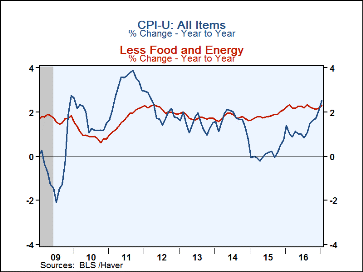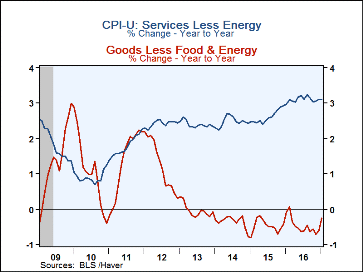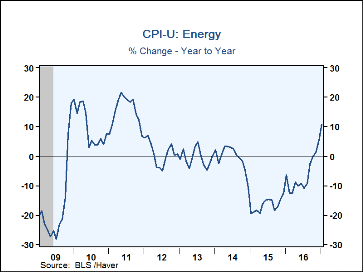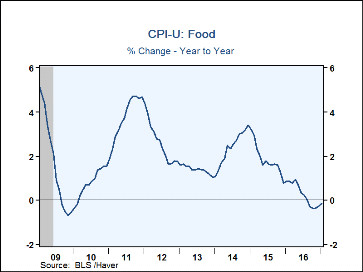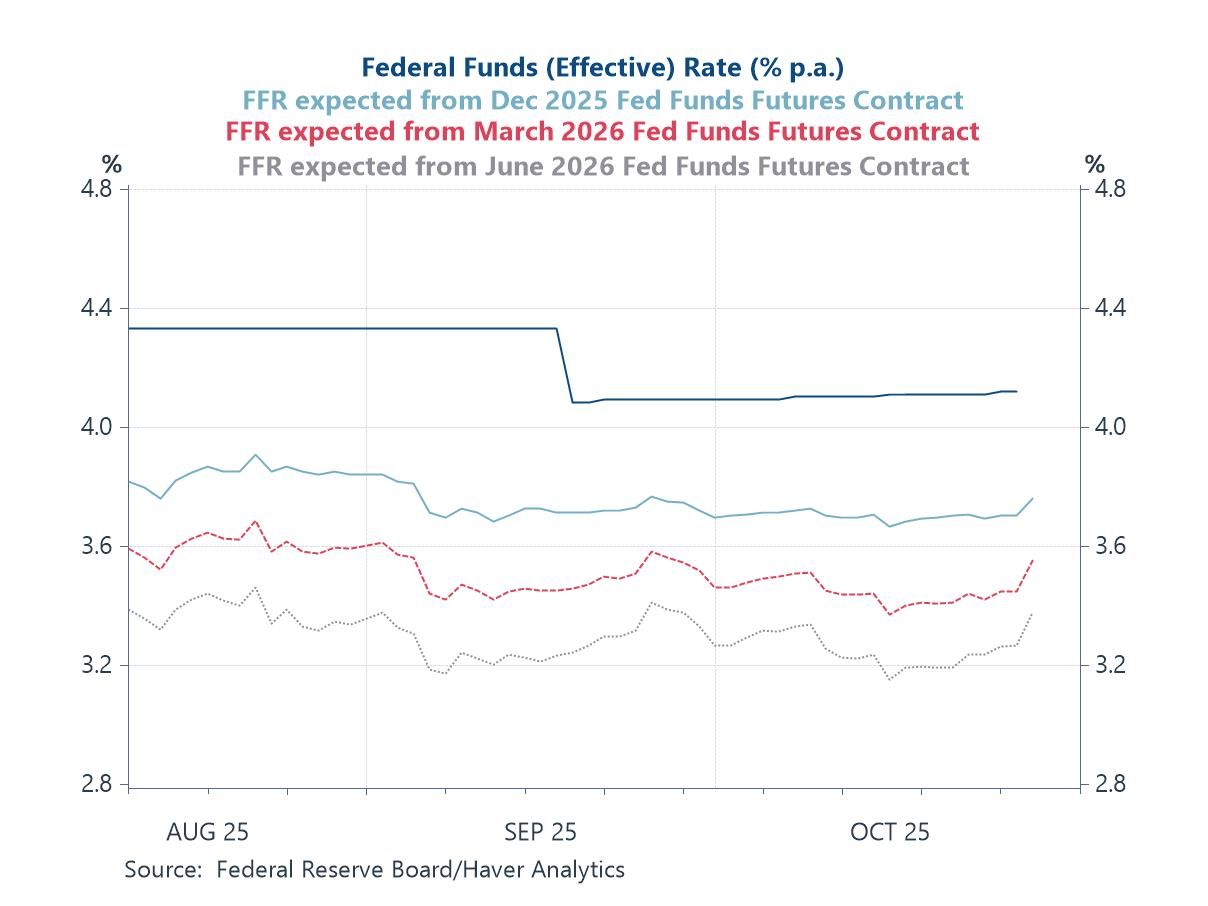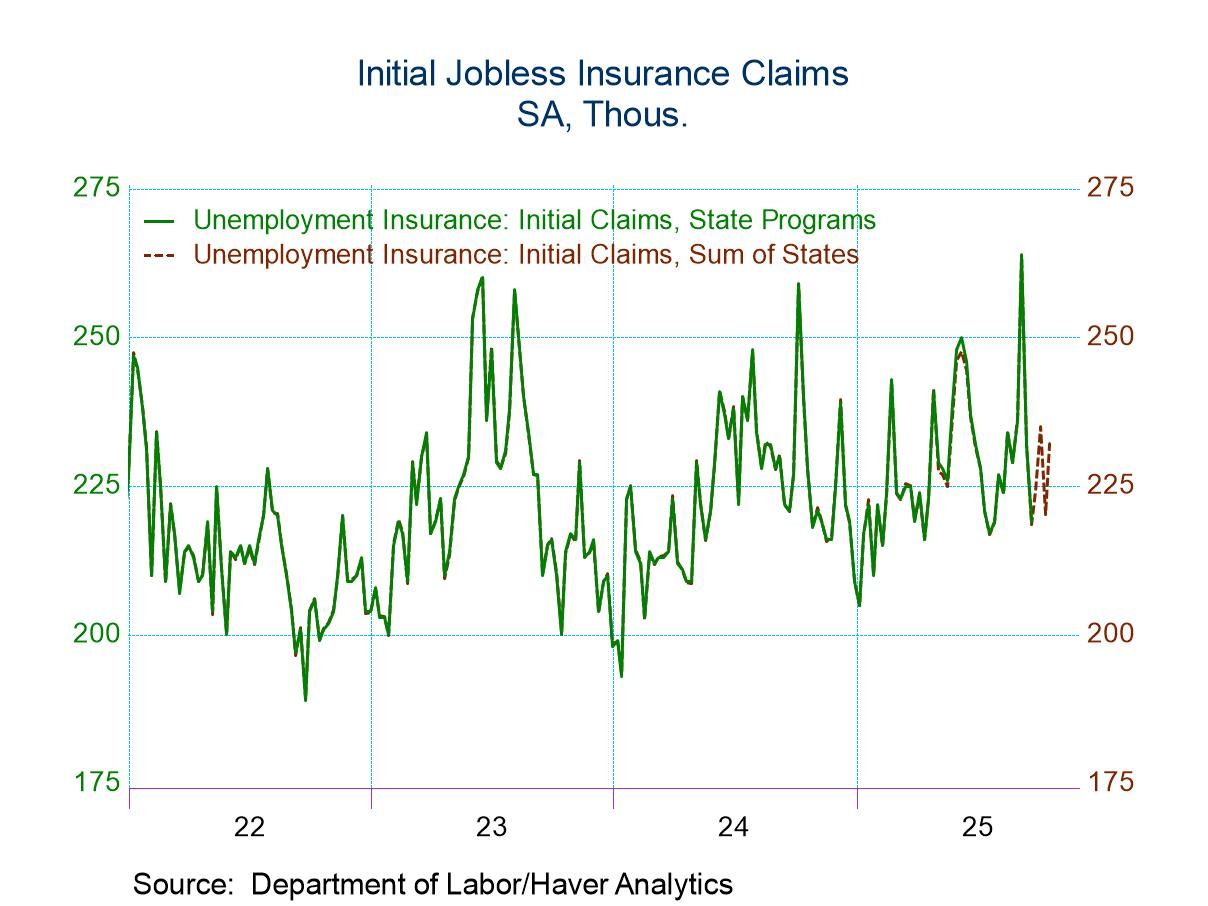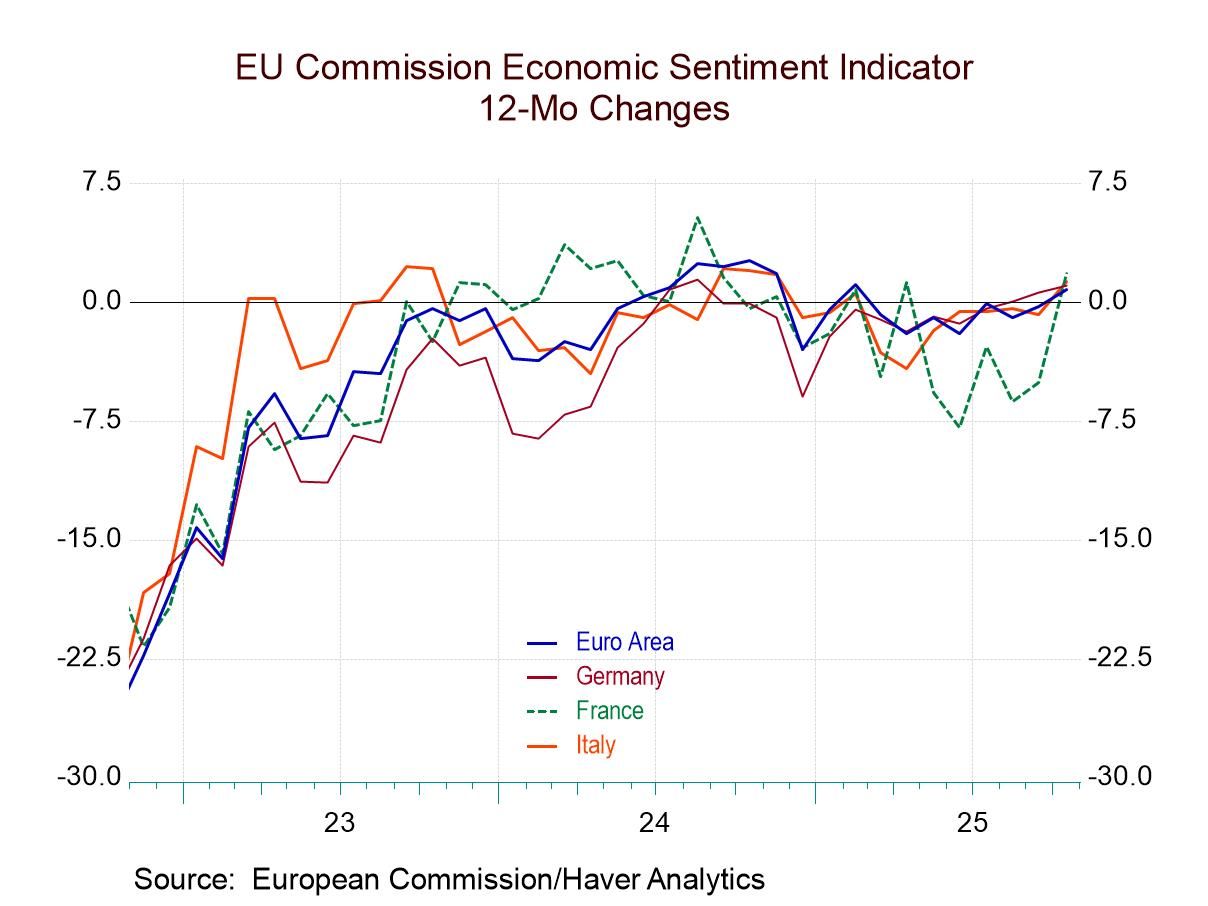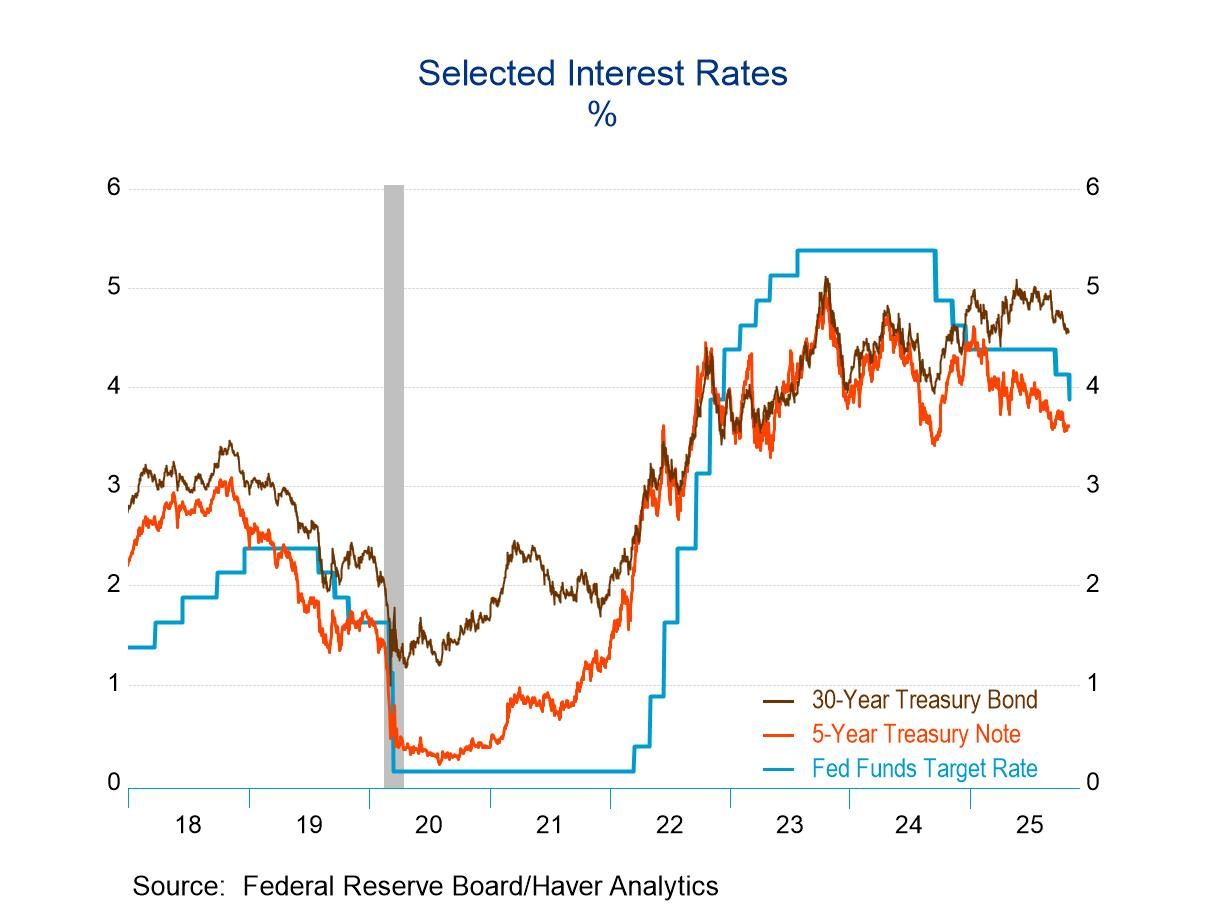 Global| Feb 15 2017
Global| Feb 15 2017U.S. CPI Strengthens With Higher Energy Prices
by:Tom Moeller
|in:Economy in Brief
Summary
The Consumer Price Index jumped 0.6% during January following a 0.3% December gain. It was the strongest rise since February 2013 and lifted y/y growth to 2.5%. Expectations had been for a 0.3% gain in the Action Economic Forecast [...]
The Consumer Price Index jumped 0.6% during January following a 0.3% December gain. It was the strongest rise since February 2013 and lifted y/y growth to 2.5%. Expectations had been for a 0.3% gain in the Action Economic Forecast Survey. Prices excluding food & energy rose 0.3% following two months of 0.2% gain. It was the firmest rise since March 2006. A 0.2% increase had been expected.
Higher energy prices led the pick-up in inflation with a 4.0% jump (10.8% y/y). Gasoline prices surged 7.8% (20.3% y/y) to the highest level since July 2015. Fuel oil prices increased 3.5% (NSA, 24.8% y/y) after a 6.0% jump. Natural gas prices improved 1.5% (10.1% y/y) while electricity costs were little changed (1.0 % y/y.
Goods prices excluding food & energy increased 0.4% (-0.2% y/y) following steadiness or decline in the prior four months. Apparel prices surged 1.4% (1.0% y/y) making up declines during three of the prior four months. New vehicle prices increased 0.9% (0.9% y/y). Home furnishings prices increased 0.4% (-1.7% y/y), but appliance prices inched just 0.1% higher (-4.3% y/y). Medical care goods prices rose 0.3% (4.7% y/y), but recreation product prices fell 0.2% (-3.6% y/y).
Prices for services less energy provided further strength with a 0.3% increase (3.1% y/y) for the third month in a row. Recreation services prices strengthened 0.7% (3.4% y/y) following no change. A 0.6% increase (3.2% y/y) in transportation prices reflected a 1.3% jump (-1.3% y/y) in public transportation costs. Medical care services prices rose 0.2% (3.6% y/y) for the third straight month. Shelter costs also rose 0.2% (3.5% y/y) following five straight months of 0.3% increase. Owners' equivalent rent of primary residences gained 0.2% (3.5% y/y), while primary residence rents gained 0.2% (3.9% y/y).
Food prices inched up 0.1% (-0.2% y/y) following six months of zero change. Dairy product prices increased 0.8% (-0.5% y/y). Meat, poultry & fish prices eased 0.1% (-2.4% y/y), but egg prices jumped 14.3% (-19.4% y/y). Fruit & vegetable prices declined 1.7% (-4.9% y/y) while cereal & bakery product costs eased 0.1% (-0.6% y/y) for a second month. Nonalchoholic beverage costs eased 0.3% (-1.0% y/y).
The consumer price data is available in Haver's USECON database while detailed figures can be found in CPIDATA. The expectations figure is from Action Economics and is found in the AS1REPNA database.
| Consumer Price Index, All Urban Consumers (%) | Jan | Dec | Nov | Jan Y/Y | 2016 | 2015 | 2014 |
|---|---|---|---|---|---|---|---|
| Total | 0.6 | 0.3 | 0.2 | 2.5 | 1.3 | 0.1 | 1.6 |
| Total less Food & Energy | 0.3 | 0.2 | 0.2 | 2.3 | 2.2 | 1.8 | 1.7 |
| Goods less Food & Energy | 0.4 | 0.0 | -0.2 | -0.2 | -0.5 | -0.5 | -0.3 |
| Services less Energy | 0.3 | 0.3 | 0.3 | 3.1 | 3.1 | 2.6 | 2.5 |
| Food | 0.1 | -0.0 | -0.0 | -0.2 | 0.3 | 1.9 | 2.4 |
| Energy | 4.0 | 1.2 | 1.0 | 10.8 | -6.6 | -16.7 | -0.3 |
Tom Moeller
AuthorMore in Author Profile »Prior to joining Haver Analytics in 2000, Mr. Moeller worked as the Economist at Chancellor Capital Management from 1985 to 1999. There, he developed comprehensive economic forecasts and interpreted economic data for equity and fixed income portfolio managers. Also at Chancellor, Mr. Moeller worked as an equity analyst and was responsible for researching and rating companies in the economically sensitive automobile and housing industries for investment in Chancellor’s equity portfolio. Prior to joining Chancellor, Mr. Moeller was an Economist at Citibank from 1979 to 1984. He also analyzed pricing behavior in the metals industry for the Council on Wage and Price Stability in Washington, D.C. In 1999, Mr. Moeller received the award for most accurate forecast from the Forecasters' Club of New York. From 1990 to 1992 he was President of the New York Association for Business Economists. Mr. Moeller earned an M.B.A. in Finance from Fordham University, where he graduated in 1987. He holds a Bachelor of Arts in Economics from George Washington University.


